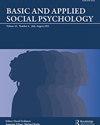不可思议的效用:心理科学的迷失原因和因果碎片
IF 1.8
3区 心理学
Q2 PSYCHOLOGY, SOCIAL
引用次数: 18
摘要
以变量为导向的、基于样本的个体差异研究策略和因果理论推理的统计建模方法依赖于它们的逻辑、一致性、正当性和假定的启发式价值,这些启发式价值建立在隐性假设的基础上,即个体在其显性功能背后的心理结构和过程方面在质量上是相同的、同质的。它们之间的数量差异是由完全相同的心理结构产生的,在每个人体内以完全相同的方式运作。然而,这种心理同质性假设显然是错误的,并且被大量无可争议的科学证据证明是无效的,这些证据表明心理异质性是人类功能的普遍特征。范式的心理同质性假设与其现象的心理异质性现实之间的这种不可调和的不匹配,使得个体差异方法论本质上无法推进关于心理和行为现象原因的理论知识。对这种不匹配的详细研究也表明,它具有相当大的解释力,是心理学研究缓慢的理论进展和复制失败的根本原因,也是心理学无法放弃其有争议的依赖于零假设显著性检验作为评估理论主张的证明标准的驱动力。本文章由计算机程序翻译,如有差异,请以英文原文为准。
Incredible Utility: The Lost Causes and Causal Debris of Psychological Science
Abstract Variable-oriented, sample-based individual differences research strategies and statistical modeling approaches to causal-theoretical inference depend on their logic, coherence, justification, and presumed heuristic value on the tacit assumption that individuals are qualitatively the same, homogeneous with respect to the psychological structures and processes underlying their overt functioning, and that quantitative differences between them are produced by exactly the same psychological structures functioning in exactly the same way within each individual. This psychological homogeneity assumption, however, is demonstrably false and invalidated by a substantial body of uncontested scientific evidence documenting psychological heterogeneity as a ubiquitous, defining characteristic of human functioning. This irreconcilable mismatch between the psychological homogeneity assumption of the paradigm and the psychologically heterogeneous realities of its phenomena renders the individual differences methodology intrinsically incapable of advancing theoretical knowledge about the causes of psychological and behavioral phenomena. A detailed look at this mismatch reveals also that it holds considerable explanatory power as the root cause of the slow theoretical progress and replication failures of psychological research, as well as the driving force behind psychology's inability to relinquish its controversial reliance on null hypothesis significance testing as a justification standard for evaluating theoretical claims.
求助全文
通过发布文献求助,成功后即可免费获取论文全文。
去求助
来源期刊

Basic and Applied Social Psychology
PSYCHOLOGY, SOCIAL-
CiteScore
4.50
自引率
12.50%
发文量
7
期刊介绍:
Basic and Applied Social Psychology (BASP) emphasizes the publication of outstanding research articles, but also considers literature reviews, criticism, and methodological or theoretical statements spanning the entire range of social psychological issues. The journal will publish basic work in areas of social psychology that can be applied to societal problems, as well as direct application of social psychology to such problems. The journal provides a venue for a broad range of specialty areas, including research on legal and political issues, environmental influences on behavior, organizations, aging, medical and health-related outcomes, sexuality, education and learning, the effects of mass media, gender issues, and population problems.
 求助内容:
求助内容: 应助结果提醒方式:
应助结果提醒方式:


